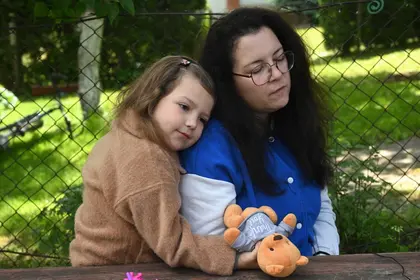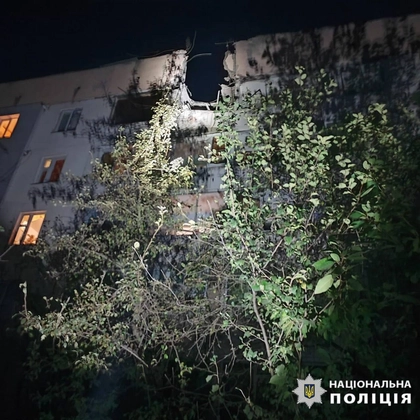Living in Russian-occupied Ukraine, 6-year-old Anna-Maria learnt to call President Vladimir Putin “Uncle Vova” and believed he was “president of the world,” her mother said.
Kateryna Skopina, a senior Ukrainian military officer, had to leave her daughter with relatives when she and her husband were captured by Russian forces in the eastern city of Mariupol last spring.
JOIN US ON TELEGRAM
Follow our coverage of the war on the @Kyivpost_official.
But the relatives were sympathetic to Moscow and kept Anna-Maria in Kremlin-occupied territory for over a year, Skopina, who was since freed, told AFP in western Ukraine.
Her daughter went to a kindergarten in a village outside Mariupol, where she said “there were programmes for brainwashing”.
“In a phone call she asked me who Uncle Vova (short for Vladimir) is, and why he is president of the whole world.”
Some 1.5 million Ukrainian children like Anna-Maria have ended up in Russian-controlled territory or in Russia since 2014, according to Mykola Kuleba, former presidential commissioner for children’s rights.
That year, Russian-supported separatists captured large swathes of east Ukraine and later distributed passports to civilians under their control.
Those children -- much like Anna-Maria -- are being “brainwashed” by Russians and many end up wanting to stay under Moscow’s control, said Kuleba, who founded the Save Ukraine charity, which seeks to bring such children back.

South Korea Demands 'Immediate Withdrawal' of North Korean Troops in Russia
- ‘Hate Ukraine’ -
Many “are already young people with Russian citizenship, who have been brainwashed, who hate Ukraine,” he said.
The International Criminal Court this year issued an arrest warrant for Putin and Russia’s children’s rights ombudswoman, who deny wrongdoing in transferring minors to Russia.
Skopina, the military officer and deputy commander for moral and psychological support, got her daughter back in May with help from Ukrainian officials negotiating with Russia.
Anna-Maria was happily playing football with her father in the garden when AFP visited. She asked her mother in Russian where they were going later.
Her daughter has become more reluctant to speak Ukrainian, her mother explained.
“Sometimes she says, ‘I don’t want to speak that (Ukrainian), let’s speak Russian’.”
Kuleba said that tendency mirrors a broader trend among children who have been held in occupied territory.
“Russia’s main goal is to turn these children Russian, to destroy Ukrainian identity -- and not just to destroy it, but to instill hatred of Ukraine,” he told AFP.
“And it’s not only the children they kidnap from orphanages there or those whose parents they have killed who undergo this. It’s all the children who are now in the occupied territories or in the war zones.”
As a result, “many children do not want to come back to Ukraine,” he admits.
- ‘Part of Russia’ -
“Hundreds of thousands of children have already accepted Russian citizenship and agreed with the picture that Russia is a rescuer who saved them and it is better to stay there.”
“All the children we bring back, who were either in camps or in Russian schools, say first of all that Ukraine is not a state -- as the Russians have taught them.”
They say, “this territory will soon be part of Russia, that terrorists -- Nazis - live here, who have come to kill them,” he added.
Skopina and her husband were taken prisoner during fierce fighting in Mariupol, which ended with Russia taking control of the city and surrounding area.
Their daughter Anna-Maria had been sent to stay with her grandparents in a village around 60 km (37 miles) away.
Her grandparents chose not to fulfil her parents’ request to drive her to safety with relatives in western Ukraine, her mother said.
AFP was unable to reach with Anna-Maria’s grandparents for comment.
Skopina said that on her release from captivity, she found herself wrangling with her in-laws over whether Anna-Maria was Ukrainian anymore.
- ‘Singing Eurovision’ -
“My mother-in-law told me in a phone conversation that children who were born in Donetsk and Lugansk regions since 2014 are Russian,” she said, despite Anna-Maria having a Ukrainian birth certificate.
After long negotiations brokered by the Ukrainian rights commissioner Dmytro Lubinets, Skopina went to Latvia’s border with Russia and waited eight hours until her mother-in-law brought out Anna-Maria, accompanied by Russian soldiers.
They told Skopina that if her daughter recognised her, she could keep her -- and luckily she did.
Family members have launched a legal probe over alleged illegal confinement or abduction of the child by her grandparents and Skopina no longer speaks to them.
Skopina said her young daughter quickly adapted to life back in Ukraine-controlled territory.
“The day afterwards, Anna-Maria was already learning ‘Stefania’ and singing it,” Skopina said, referring to Ukraine’s winning entry in the Eurovision Song Contest last year, with lyrics in Ukrainian.
“We don’t need to teach children anything. They understand by themselves.”
You can also highlight the text and press Ctrl + Enter






